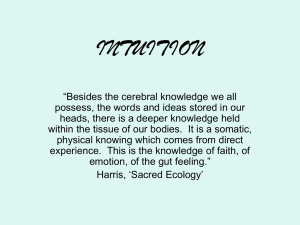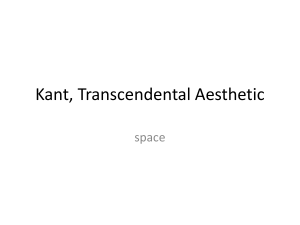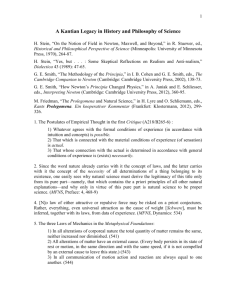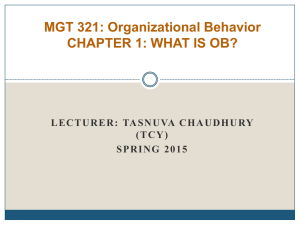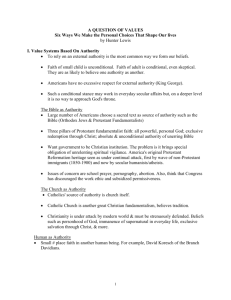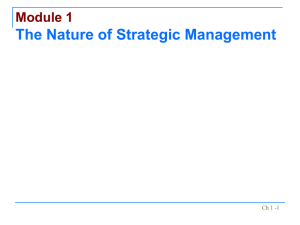Session 5: Kant`s Prolegomena (extract)
advertisement
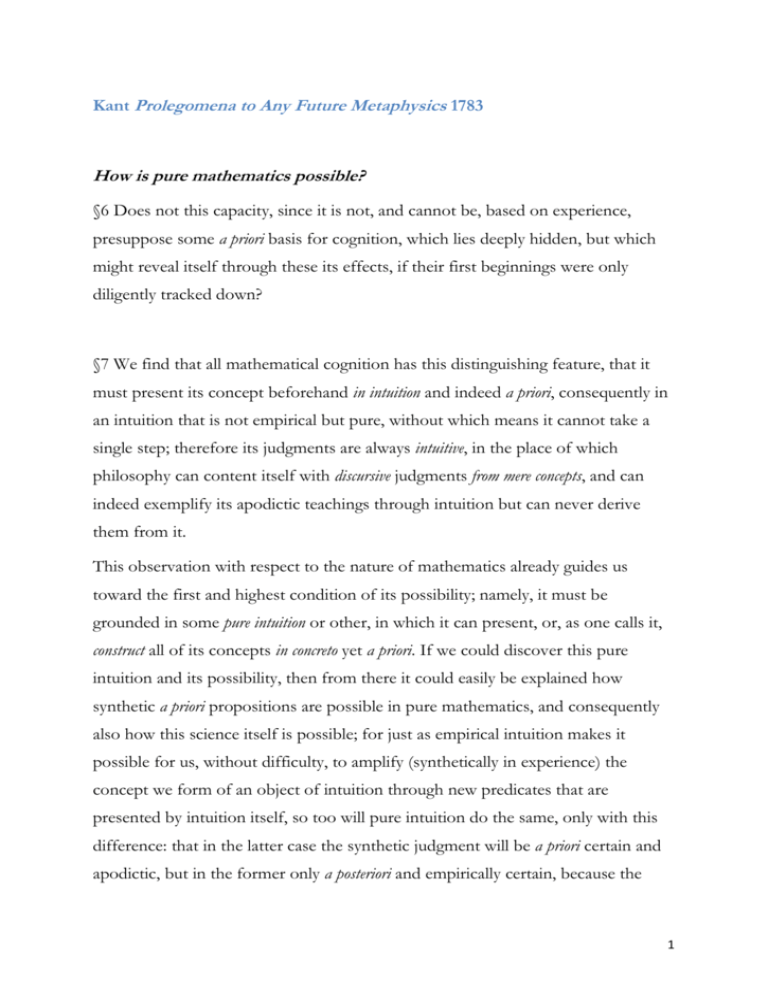
Kant Prolegomena to Any Future Metaphysics 1783 How is pure mathematics possible? §6 Does not this capacity, since it is not, and cannot be, based on experience, presuppose some a priori basis for cognition, which lies deeply hidden, but which might reveal itself through these its effects, if their first beginnings were only diligently tracked down? §7 We find that all mathematical cognition has this distinguishing feature, that it must present its concept beforehand in intuition and indeed a priori, consequently in an intuition that is not empirical but pure, without which means it cannot take a single step; therefore its judgments are always intuitive, in the place of which philosophy can content itself with discursive judgments from mere concepts, and can indeed exemplify its apodictic teachings through intuition but can never derive them from it. This observation with respect to the nature of mathematics already guides us toward the first and highest condition of its possibility; namely, it must be grounded in some pure intuition or other, in which it can present, or, as one calls it, construct all of its concepts in concreto yet a priori. If we could discover this pure intuition and its possibility, then from there it could easily be explained how synthetic a priori propositions are possible in pure mathematics, and consequently also how this science itself is possible; for just as empirical intuition makes it possible for us, without difficulty, to amplify (synthetically in experience) the concept we form of an object of intuition through new predicates that are presented by intuition itself, so too will pure intuition do the same, only with this difference: that in the latter case the synthetic judgment will be a priori certain and apodictic, but in the former only a posteriori and empirically certain, because the 1 former only contains what is met with in contingent empirical intuition, while the latter contains what necessarily must be met with in pure intuition, since it is, as intuition a priori, inseparably bound with the concept before all experience or individual perception. §8 But with this step the difficulty seems to grow rather than diminish. For now the question runs: How is it possible to intuit something a priori? An intuition is a representation of the sort which would depend immediately on the presence of an object. It therefore seems impossible originally to intuit a priori, since then the intuition would have to occur without an object being present, either previously or now, to which it could refer, and so it could not be an intuition. ... But how can the intuition of an object precede the object itself? §9 If our intuition had to be of the kind that represented things as they are in themselves, then absolutely no intuition a priori would take place, but it would always be empirical. For I can only know what may be contained in the object in itself if the object is present and given to me. Of course, even then it is incomprehensible how the intuition of a thing that is present should allow me to cognize it the way it is in itself, since its properties cannot migrate over into my power of representation; but even granting such a possibility, the intuition still would not take place a priori, i.e., before the object were presented to me, for without that no basis for the relation of my representation to the object can be conceived; so it would have to be based on inspiration. There is therefore only one way possible for my intuition to precede the actuality of the object and occur as an a priori cognition, namely if it contains nothing else except the form of sensibility, which in me as subject precedes all actual impressions through which I am affected by objects. For I can know a priori that the objects of the senses can be intuited only in accordance with this form of sensibility. From this it follows: that propositions which relate merely to this form 2 of sensory intuition will be possible and valid for objects of the senses; also, conversely, that intuitions which are possible a priori can never relate to things other than objects of our senses. §10 Therefore it is only by means of the form of sensory intuition that we can intuit things a priori, though by this means we can cognize objects only as they appear to us (to our senses), not as they may be in themselves; and this supposition is utterly necessary, if synthetic propositions a priori are to be granted as possible, or, in case they are actually encountered, if their possibility is to be conceived and determined in advance. Now space and time are the intuitions upon which pure mathematics bases all its cognitions and judgments, which come forward as at once apodictic and necessary; for mathematics must first exhibit all of its concepts in intuition – and pure mathematics in pure intuition – that is, it must first construct them, failing which (since mathematics cannot proceed analytically, namely, through the analysis of concepts, but only synthetically) it is impossible for it to advance a step, that is, as long as it lacks pure intuition, in which alone the material for synthetic judgments a priori can be given. Geometry bases itself on the pure intuition of space. Even arithmetic forms its concepts of numbers through successive addition of units in time, but above all pure mechanics can form its concepts of motion only by means of the representation of time. Both representations are, however, merely intuitions; for, if one eliminates from the empirical intuitions of bodies and their alterations (motion) everything empirical, that is, that which belongs to sensation, then space and time still remain, which are therefore pure intuitions that underlie a priori the empirical intuitions, and for that reason can never themselves be eliminated; but, by the very fact that they are pure intuitions a priori, they prove that they are mere forms of our sensibility that must precede all empirical intuition (i.e., the perception of actual objects), and in accordance with which objects can be cognized a priori, though of course only as they appear to us. 3 §11 The problem of the present section is therefore solved. Pure mathematics, as synthetic cognition a priori, is possible only because it refers to no other objects than mere objects of the senses, the empirical intuition of which is based on a pure and indeed a priori intuition (of space and time), and can be so based because this pure intuition is nothing but the mere form of sensibility, which precedes the actual appearance of objects, since it in fact first makes this appearance possible. This faculty of intuiting a priori does not, however, concern the matter of appearance – i.e., that which is sensation in the appearance, for that constitutes the empirical – but only the form of appearance, space and time. ... the two are ... nothing more than formal conditions of our sensibility, and objects are taken merely for appearances; for then the form of appearance, i.e., the pure intuition, certainly can be represented from ourselves, i.e., a priori. §12 In order to add something by way of illustration and confirmation, we need only to consider the usual and unavoidably necessary procedure of the geometers. All proofs of the thoroughgoing equality of two given figures (that one can in all parts be put in the place of the other) ultimately come down to this: that they are congruent with one another [that they coincide]; which plainly is nothing other than a synthetic proposition based upon immediate intuition; and this intuition must be given pure and a priori, for otherwise that proposition could not be granted as apodictically certain but would have only empirical certainty. It would only mean: we observe it always to be so and the proposition holds only as far as our perception has reached until now. ... Therefore pure intuitions a priori indeed actually do underlie mathematics, and make possible its synthetic and apodictically valid propositions; and consequently our transcendental deduction of the concepts of space and time at the same time explains the possibility of a pure mathematics, a possibility which, without such a deduction, and without our assuming that “everything which our senses may be given (the outer in space, the inner in time) is only intuited by us as it appears to us, not as it is in itself,” could indeed be granted, but into which we could have no insight at all. ... 4 Note 1 Pure mathematics, and especially pure geometry, can have objective reality only under the single condition that it refers merely to objects of the senses, with regard to which objects, however, the principle remains fixed, that our sensory representation is by no means a representation of things in themselves, but only of the way in which they appear to us. From this it follows, not at all that the propositions of geometry are determinations of a mere figment of our poetic phantasy, and therefore could not with certainty be referred to actual objects, but rather, that they are valid necessarily for space and consequently for everything that may be found in space, because space is nothing other than the form of all outer appearances, under which alone objects of the senses can be given to us. Sensibility, whose form lies at the foundation of geometry, is that upon which the possibility of outer appearances rests; these, therefore, can never contain anything other than what geometry prescribes to them. It would be completely different if the senses had to represent objects as they are in themselves. For then it absolutely would not follow from the representation of space, a representation that serves a priori, with all the various properties of space, as foundation for the geometer, that all of this, together with what is deduced from it, must be exactly so in nature. The space of the geometer would be taken for mere fabrication and would be credited with no objective validity, because it is simply not to be seen how things would have to agree necessarily with the image that we form of them by ourselves and in advance. If, however, this image – or, better, this formal intuition – is the essential property of our sensibility by means of which alone objects are given to us, and if this sensibility represents not things in themselves but only their appearances, then it is very easy to comprehend, and at the same time to prove incontrovertibly: that all outer objects of our sensible world must necessarily agree, in complete exactitude, with the propositions of geometry, because sensibility 5 itself, through its form of outer intuition (space), with which the geometer deals, first makes those objects possible, as mere appearances. It will forever remain a remarkable phenomenon in the history of philosophy that there was a time when even mathematicians who were at the same time philosophers began to doubt, not, indeed, the correctness of their geometrical propositions insofar as they related merely to space, but the objective validity and application to nature of this concept itself and all its geometrical determinations, since they were concerned that a line in nature might indeed be composed of physical points, consequently that true space in objects might be composed of simple parts, notwithstanding that the space which the geometer holds in thought can by no means be composed of such things. They did not realize that this space in thought itself makes possible physical space, i.e., the extension of matter; that this space is by no means a property of things in themselves, but only a form of our power of sensory representation; that all objects in space are mere appearances, i.e., not things in themselves but representations of our sensory intuition; and that, since space as the geometer thinks it is precisely the form of sensory intuition which we find in ourselves a priori and which contains the ground of the possibility of all outer appearances (with respect to their form), these appearances must of necessity and with the greatest precision harmonize with the propositions of the geometer, which he extracts not from any fabricated concept, but from the subjective foundation of all outer appearances, namely sensibility itself. In this and no other way can the geometer be secured, regarding the indubitable objective reality of his propositions, against all the chicaneries of a shallow metaphysics, however strange this way must seem to such a metaphysics because it does not go back to the sources of its concepts. 6 Note 2 Everything that is to be given to us as object must be given to us in intuition. But all our intuition happens only by means of the senses; the understanding intuits nothing, but only reflects. Now since, in accordance with what has just been proven, the senses never and in no single instance enable us to cognize things in themselves, but only their appearances, and as these are mere representations of sensibility, “consequently all bodies together with the space in which they are found must be taken for nothing but mere representations in us, and exist nowhere else than merely in our thoughts.” Now is this not manifest idealism? Idealism consists in the claim that there are none other than thinking beings; the other things that we believe we perceive in intuition are only representations in thinking beings, to which in fact no object existing outside these beings corresponds. I say in opposition: There are things given to us as objects of our senses existing outside us, yet we know nothing of them as they may be in themselves, but are acquainted only with their appearances, that is, with the representations that they produce in us because they affect our senses. Accordingly, I by all means avow that there are bodies outside us, that is, things which, though completely unknown to us as to what they may be in themselves, we know through the representations which their influence on our sensibility provides for us, and to which we give the name of a body – which word therefore merely signifies the appearance of this object that is unknown to us but is nonetheless real. Can this be called idealism? It is the very opposite of it. 7

